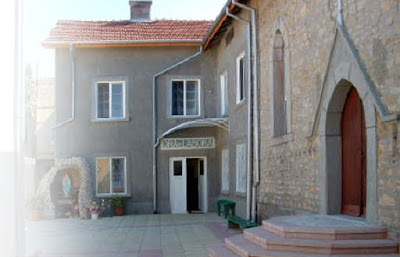BULGARIA
Historical Background
The production of the skin ointment from marigold flowers and oil from lily flowers, popular in Bulgaria and abroad, because of its effectiveness, was popularized by our German sisters. Aside from the ointments, they also prescribed herbal plants for healing.
In 1918, the mission had to be temporarily closed due to the First World War. In 1920, seven Sisters traveled back to Bulgaria and continued their mission with great zeal. The apostolate flourished and the community expanded. Soon the first Bulgarian candidates entered and on October 20, 1925 three Bulgarian Novices made their first profession. In 1922, the mission branched out to Bardarski-Geran and in 1926, to Dragomirovo. These two villages are in Danube River area. The Sisters established a Kindergarten and an orphanage and also continued their health apostolate.
A turbulent period for the monastery started in 1944, when Russian soldiers entered Bulgaria and some of them were posted in Zarevbrod to keep close watch of the movement in the monastery. Consequently, thirteen German Sisters had to go back to their homeland. The remaining twelve German Sisters were put in a concentration camp for one year. Thereafter the Motherhouse in Tutzing called all of them back to Germany. However, two Sisters requested to remain and stay with the Bulgarian Sisters. When the Sisters encountered the greatest period of terror, Dr. Anna Genkova, a friend of the Sisters, proposed to them to offer a part of the convent to the Ministry of Health to be used as a Hospital for mentally handicapped. The Sisters had for their disposal the chapel, some small rooms, the cellar, the attic and a portion of the yard.
Throughout the following more than 40 years the Sisters, sustained by God's faithfulness, continued their mission in silence and in suffering. They were allowed to wear their habit only inside the compound. Their work was very much appreciated by the hospital personnel and the outside people held them in high esteem.
The community was out of contact with the Congregation until in the late sixties when initial meetings between the Bulgarian Sisters and the Generalate took place, first in Croatia and later in Bulgaria. After the fall of the Berlin Wall, the first two German missionaries, Sr. Quirina Seidl and Sr. Barbara Döring were sent to Bulgaria in 1992. Since then missionaries from Germany, Korea, Philippines, Brazil, Poland and Namibia have worked and are still working in the Lord's vineyard, in Zarevbrod and since 2000 in Sekirovo, southern part of Bulgaria, Diocese of Plovdiv.
The present community of Zarevbrod, composed of four Sisters, aside from producing the skin ointment, "mexlem", is engaged in interreligious relationships by its very presence in the village, where the great majority of the population is Orthodox or Muslim. The Sisters do pastoral work, facilitate summer camps with the help of young Bulgarian animators and network with other institutions, like elementary school and Kindergartens. They welcome foreigners and local tourists, giving them an experience of Benedictine hospitality. The only remaining Bulgarian Sister, Sr. Bernadetta, takes care of the flower garden, especially the roses and the marigold flowers. An ecological project is being initiated through a herbal garden. At present the former guest and parish house is undergoing a major renovation and afterwards the convent will need huge repairs.
Sekirovo, unlike Zarevbrod, has a mostly catholic population. The four Sisters are working in St. Michael parish. They take care of cleaning and decorating the church, are responsible for First Communion preparation, Bible Sharing and choir practices. During summer, they organize children's camps. One Sister teaches English and trains Mass lectors.
The mission in Bulgaria is a unique one, in the sense that until now the consequences of more than forty years of Communist regime, where religion was totally suppressed, are still strongly felt. However, the life of our former Sisters who endured persecution and yet persevered, as well as the actual material and spiritual poverty of the people strongly commits us to continue this mission.
That in all things God may be glorified!


















0 Comments